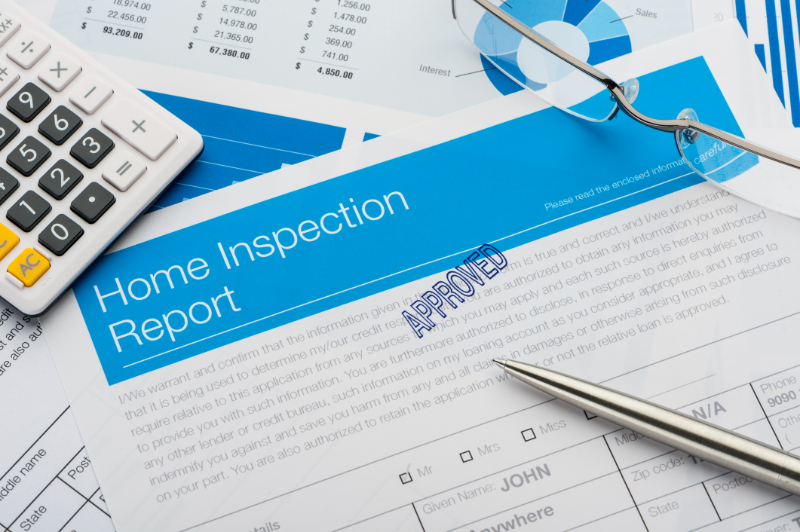As you go through the process of selling your home in La Jolla, CA, you’ll reach the point when you can almost see the finish line. The house has received multiple bids and you’ve accepted a very favorable offer. All that’s left is to conduct a home inspection, after which there may be some negotiation, and then, when both parties reach an agreement, there’ll be a closing, and you’ll have sold a house.
That’s the most realistic run of events most hope for when selling their properties. However, the inspection may not always turn out as we would want, and issues can arise at this crucial stage that can derail your plans.
Knowing how to prepare for a home inspection will go a long way to securing that home sale, without undue stress and worry.
Table of Contents:
What is a Home Inspection?
A home inspection is one of the most important points when selling your home. For buyers, it provides peace of mind, ensuring they’re fully aware of the home’s condition before making a final commitment.
For sellers, inspections present an opportunity to address any potential issues before a sale. Sellers who proactively address any repair needs before listing can present a home that’s in top condition, which reduces the risk of negotiations or stalling due to issues found during the inspection. If issues do arise during the inspection, being willing to work with the buyer on reasonable repairs or credits can help keep the deal on track.
While there can be a natural anxiety for sellers when a home inspection is conducted, they can work in your favor if approached strategically. A well-documented inspection highlighting the strengths of your home — like an updated electrical system that exceeds code requirements or newly installed ductwork — enhances the desirability of your listing. When a third-party inspector confirms the home’s good condition, it strengthens your negotiation position and buyers are more likely to feel confident in their purchase, which can lead to smoother transactions.
What Does a Home Inspector Look at?
A home inspector’s job is to assess the major systems and structural elements of a home. During an inspection, they will carefully examine areas that impact the safety, functionality, and longevity of the property, such as:
- The home’s foundation, framing, and structural integrity
- The roof’s condition, including shingles, gutters, and potential leaks
- Siding, foundation, and drainage systems to identify any exterior issues that may need attention
- The components of your electrical system, including any outlets, wiring, and circuit breakers
- Plumbing, including pipes, water heaters, and any signs of water damage
- HVAC systems
- Interior features, including walls, ceilings, floors, and insulation for signs of damage or wear
Common Issues Found During Inspections
Having your home inspected by a professional can be nerve-wracking. After all, their job is to uncover any issues with the property — big or small — which could feel like a critique of poor upkeep and also have a material effect on the value of your property. At this time it’s best to keep in mind that no home is perfect and every home will have something that can be improved.
Instead of viewing the inspection as a list of flaws of your beloved home, think of it as a valuable source of information. A professional inspection report gives you a clearer picture of what needs attention, helping you make repairs that can maintain or even increase your home’s value. Pre-listing inspections are especially useful, as they offer insight into the true condition of your property before it hits the market.
Some common issues found during inspections include:
- Foundation or structural issues
Many of the beautiful older homes in La Jolla, CA, while full of charm, can sometimes have underlying foundation or structural problems. Settling, cracks, or outdated construction materials can present challenges, particularly in properties that have stood for decades.
- Roofing and water damage
With La Jolla’s proximity to the coast, the salty air and moisture can take a toll on roofing materials. Water damage from leaks or inadequate drainage is often noted, especially in older homes that may not have modern waterproofing.
- HVAC and electrical system concerns
Home inspectors often find issues with HVAC systems that may be outdated or poorly maintained. Similarly, older electrical systems may not meet current safety standards or need upgrades to handle modern electrical loads.
- Mold or termite damage
The moisture in the air, combined with older construction materials, can create the perfect environment for mold or termites to thrive. Inspectors will flag these issues, which can impact the sturdiness of a home’s structure and the health of its residents.
How to Prepare Your Home for Inspection
Knowing how to prepare for a home inspection can make a huge difference, not only to the report but also to how you experience the whole home-buying process. Here’s how to get your house ready and ensure a smooth process:
Conduct a Pre-listing Inspection
A pre-listing inspection is a professional inspection done before your home goes on the market. It covers the same aspects that a buyer’s inspection does. The advantage is that you have an early understanding of any potential issues before the buyer comes in.
A pre-listing inspection allows you to address repairs ahead of time, giving you more control over the process. It also provides a credible, third-party report that highlights your home’s strengths — something you can share with prospective buyers to instill confidence. Ultimately, this can streamline negotiations and help prevent unexpected surprises during a sale.
Take Care of Minor Repairs
Before the inspection, take care of the small things that are easily overlooked. Complete basic repairs like recaulking showers, tubs, and sinks, tightening loose fixtures, or repairing torn window screens. These minor fixes show that you’ve taken good care of your property, and can prevent small issues from becoming red flags in an inspection report.
Make Sure Access Points are Unblocked
Decluttering and cleaning can make a big difference, not only in presentation but also in allowing the inspector to move through your home efficiently. Ensure that access points like attics, crawl spaces, and utility rooms are easy to reach and not blocked by storage. Inspectors will need to look in these areas, and having everything ready to go will make the process faster and more efficient.
Temporarily Crating or Relocating Pets
If you have pets, it’s a good idea to crate them or temporarily relocate them during the inspection. Not only will this help the inspector move through your home without distractions, but it also ensures your pets’ safety and comfort throughout the process.
Provide Documentation of Past Repairs and Upgrades
If you’ve made recent repairs or upgrades, be sure to have the paperwork ready. Providing documentation of any work done to the property — from a roof replacement to an upgraded HVAC system — gives the inspector a clearer understanding of the home’s condition and reassures buyers that the property has been well cared for.
During the Inspection

Now that you understand how to prepare for a home inspection, here’s what the actual day may look like.
The Inspection Timeline and What It Involves
Most home inspections last between two to four hours, depending on the size and condition of the property. As mentioned above, during the inspection, the inspector will assess the key components of your home, such as the roof, foundation, plumbing, electrical systems, HVAC, and its overall structural integrity. They’ll also be looking for any signs of damage, wear, or potential safety hazards.
Expect the inspector to check appliances, examine windows and doors, and look for moisture or mold in areas like the basement or attic. Additionally, they’ll be keeping an eye out for signs of water damage, faulty wiring, or anything that might not be up to code.
After the inspection has been conducted, the inspector will create a comprehensive document of all of their findings called an inspection report. This report is typically provided to the buyer and their agent and serves as the basis for any post-inspection negotiations.
How to Handle Inspector Questions or Concerns
During the inspection, the inspector may have questions or raise concerns about certain areas of the home. If you’re present, it’s important to remain calm and open. Provide clear answers when needed, and don’t be afraid to share documentation for any repairs or upgrades you’ve completed.
Remember, inspectors are trained to be thorough. They’re not looking to find fault for the sake of it — they’re simply doing their job to assess the property’s condition. Listen carefully, answer honestly, and avoid being defensive.
If you’re not there, your real estate agent can handle these questions on your behalf, ensuring a professional response and relaying any concerns back to you.
Should the Seller Be Present During the Inspection?
Deciding whether to be present during the inspection depends on personal preference. There are pros and cons to each approach.
Being present allows you to provide immediate answers to questions and give the inspector or buyer’s agent additional context about your home. You’ll also be able to get a firsthand understanding of any issues that come up. However, it can be nerve-wracking to witness the inspection in real time, especially if problems are discovered.
On the other hand, many sellers choose not to be present during the inspection. This gives the buyer, their agent, and the inspector space to conduct the inspection. In cases such as this, your real estate agent can manage any questions and ensure you’re kept in the loop without being directly involved.
How a Real Estate Agent Can Help You
Having a skilled real estate agent by your side can significantly ease the home inspection process. From preparing your home beforehand to navigating post-inspection negotiations, here’s how an agent can provide critical support along the way.
Guiding You Through the Preparation Process
Before the inspection takes place, your agent will help ensure your home is in the best possible condition. They’ll walk through your property with an expert eye, identifying any minor repairs or cosmetic updates that should be addressed before the inspection. Common areas where issues often arise can be reviewed, allowing you to tackle low-hanging fruit that might otherwise become sticking points later on.
A pre-listing inspection is another tool your agent might recommend. They’ll guide you through this process, making sure you understand what repairs or disclosures will benefit your sale.
Acting as a Liaison During the Inspection
On the day of the inspection, your agent plays a crucial role as the intermediary between you, the inspector, and the buyer’s agent. If you choose not to be present, your agent will stay in close communication with the inspector, ensuring any questions or concerns are answered professionally. They’ll provide the necessary documentation for recent repairs or upgrades and make sure the inspector has easy access to all areas of the home.
This hands-on approach prevents misunderstandings and keeps the process moving smoothly. Your agent can also help set the right tone by managing expectations and handling any issues that arise in a calm, objective manner. If the inspector notes a concern, your agent will work with you to frame these findings in the most favorable way possible during the next steps of the sale.
Managing Post-Inspection Negotiations
Once the inspection report is complete, your agent’s negotiation skills will be critical. If the inspection reveals significant issues, buyers may request repairs, a lowering of the asking price, or place contingencies. Your agent will help you assess these requests and decide on the most strategic course of action. Sometimes, agreeing to a small repair can keep the deal on track, while in other cases, accepting a lower bid may make more sense. Your agent’s expertise ensures that you’re making informed decisions that protect your interests.
If the inspection report highlights positive aspects of your home — such as newly upgraded systems or excellent maintenance — your agent will make sure these are emphasized during negotiations. They’ll work to minimize concessions and focus on the home’s strengths, helping you maintain your asking price or keep negotiations within reasonable limits.
In short, your agent’s role throughout the inspection process is invaluable. From preparation to negotiations, they provide the expertise and support needed to navigate this often complicated stage of selling your home.
Sell your La Jolla Home with the Help of Trusted Experts

We understand that selling your home is a significant journey, and La Jolla Shores Broker is dedicated to ensuring that every step is expertly managed. From preparing for detailed inspections to mastering the art of negotiation, our deep-rooted knowledge of La Jolla, California’s real estate allows us to guide you with precision and care.
Let us handle the intricacies of the sale while you focus on your next chapter. Reach out to La Jolla Shores Broker at 619.315.6040 or send us a message here.

